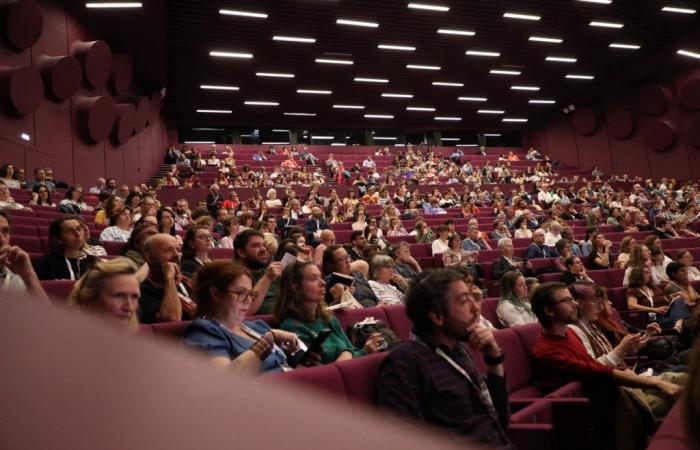Stunned, the booksellers, the day after the presentation by Xerfi Specific of a bleak study on the financial situation of their businesses? Rather uplifted, and determined to stand up collectively. “ The question is not whether we are going into the wall as Xerfi predicts. But rather, how far are we from the wall? Now is the time to react », enjoined Matthew de Montchalindirector of the L’Armitière bookstore in Rouen and president of ALIRE.
Throughout this second day of the National Bookstore Meetings (RNL), organized in Strasbourg by the French Bookstore Union on June 16 and 17, 800 booksellers took on the present and future challenges head-on, to map out new paths in an environment strewn with pitfalls.
Not so powerful AIs
A first leap into the future opened the ball early in the morning to consider the future of books and booksellers in a society disrupted by artificial intelligence. Recalling that “ writing is one of the first materializations of AI », the writer and researcher André Ouredniklecturer at the École Polytechnique Fédérale de Lausanne (EPFL) and the University of Neuchâtel, highlights the limits of AI, particularly generative.
“ The texts produced by AI are not devoid of emotions, they carry an excess of emotions torn out, decomposed, in a living dead statement, a kind of virtual Frankenstein. The reader of the future will want to reassure themselves that they are not reading a living dead person, so we can expect a resurgence of interest in flesh-and-blood, certified human authors. », he predicts not without irony. “ In the age of AI, the bookstore has everything to gain from profiling itself as a place of meetings and exchanges, a counter-model to a world of pure mathematical maximization of sales “, still believes the researcher.
New conquests
Competition from AI and the web joins that of screens, highlighted as one of the main factors in keeping young people away from reading. “ The urgency of screen education seems important to me “, explain Elodie Bubendorff, co-manager of La bouquinette in Strasbourg. According to her, it is also, through various meetings and initiatives such as “Young people in bookstores”, “ make the author tangible ” for kids.
This is, for example, what the National Book Center is doing by developing author residencies in schools or “ in so-called learning summer camps, and in leisure centers “, noted Régine Hatchondo, president of the National Book Center. But ” it is also the young parents who must be brought back to the bookstore “, underlines Sandrine Vigroux, Director Market Intelligence Entertainment at GfK. Quantifying the explosion of the youth segment in eight years with 84 million copies sold in 2015 compared to 112 million copies in 2023, all thanks in particular to manga and comics, Sandrine Vigroux nevertheless recalls that independent booksellers have lost market share for the benefit of the Internet in the prescribed books segment. “ Will the implementation of the Darcos law make it possible to reshuffle the cards and bring the buyer of prescribed books back into stores? This is the big question that we will follow closely “, she assures. The expert also points out that “ in the scope of book purchases for those under 25, there is a potential of 4 million copies per year to be collected by independent booksellers “.
Opportunity under the microscope
Another market with high potential identified by these RNL: second-hand books. Documented by a study by Sofia and the Ministry of Culture published last April, its development could be subject to annual monitoring, with discussions underway with the Ministry of Culture. While nearly 20% of books were purchased second-hand in 2022, and this market represents around 350 million euros in turnover, “ 80% of booksellers surveyed do not offer second-hand sales, and two thirds of them do not plan to do so », reports Bertrand Legendrescientific leader of this study.
An observation which could well change if the interest of booksellers in this subject is to be believed, although second-hand goods currently represent only 1% of their turnover. Present during the RNL, Gibert and the Nosoli group (Furet du Nord, Decitre) both positioned themselves as “ partners » booksellers, both as suppliers of second-hand books, but also as facilitators with solutions (platforms, applications) allowing them to offer the purchase and resale of second-hand books.
“ The opportunity is evaporating from our stores, concentrating in large logistics and digital players (…) We must find an economic model in our networks of physical stores “, guest Nicolas Vielle, commercial director of Gibert. While the executive had opened the way to a tax on second-hand books, making it possible to remunerate creation, this proposal remains pending given the political context, but continues to fuel debate. “ There is a balance that is being broken and a distribution of value that must at least be questioned. », considers for example Geoffroy Pelletierdirector of Sofia, inviting discussions with all stakeholders.
Common front
Establishing itself as an interprofessional meeting, the RNL offers a platform of choice for calls for discussions… and a common front. “ The profitability points we seek will be achieved in the manner of a mille-feuille. We all need to come around the table to find solutions to our problems together. “, says bookseller Matthieu de Montchalin. “ When we manage to be 800 booksellers in Strasbourg, we constitute a force capable of forcing others to think with us », he continues.
A force that will meet again in two years, to measure the progress made and break new ground. Perhaps in the West, this time, or in the Occitanie region, the only one not yet to have hosted the RNL.






